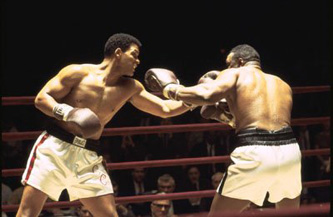|
|
A-List: Five Best Boxing MoviesBy J. Don BirnamNovember 26, 2015
2. Million Dollar Baby (2004). For the longest time, I had a complicated relationship with the other Best Picture Oscar winner that featured boxing, Clint Eastwood’s Million Dollar Baby. The plot seemed manipulative to an extreme, setting you up for a big high to be followed by a great low. But all that aside, when viewed from a distance, the movie is a great triumph of moviemaking. Hillary Swank’s performance is that moving, and Morgan Freeman turns in one of the best of his career. Consider also that a movie about a female boxer was no easy task, and that Clint Eastwood did what he did best both as the curmudgeonly old trainer, but also as the seasoned director who knows how to weave effectively between fighting shots and dramatic close-ups. The ending is legendary and suffers from none of the sodding banalities that litter Rocky and make it seem like a Disneyland ride. Million Dollar Baby is a boxing movie - triumphs, tragedy, perseverance, heroism - but it is really a human story movie. The desires to follow one’s calling and the tragedy that can cruelly befall it transcend boxing, as both are so strong in this movie that they haunt whatever endeavor it is we long for. 1. Raging Bull (1980). Million Dollar Baby is head and shoulders above the rest of the boxing movie competition. But when it comes to the best boxing movie of all time, I doubt there would ever be any serious debate or dispute that Martin Scorsese’s masterpiece, Raging Bull, it the unanimous winner. It’s hard to tell if it’s Robert De Niro’s timeless performance, Thelma Schoonmaker’s precise and jarring editing, the Italian-sounding soundtrack, or Scorsese’s careful directorial style itself, but the movie is now considered one of the greatest American masterpieces of all time. The story is that of Jake LaMotta, now an aging comedian qua boxer who reflects on the triumphs and tragedies of his life. His brother, a chilling Joe Pesci (presaging his stunning performance a decade later in Goodfellas), has mafia connections, and his girl Vickie is as much a headache as a revelation. But where Rocky is saccharine, Ali is exposition, and where The Champ is groundbreaking, Raging Bull is simply unforgiving. Hope gives space to despair, love gives way to bitterness and, in the end, Scorsese does what only he could pull off - evokes the legendary “I could have been a contender” speech by Marlon Brando in On the Waterfront to brilliantly capture the anxiety of the man and of the era. The bull raging inside LaMotta raged hard and took him to incredible heights, but was also the source of his destruction. His life was in shambles by his own hand, just like the trite boxer who succeeds constructs his own triumph. It is easier (in reality) and harder (for a filmmaker), however, to portray a devastating result, then the uplifting spirit that one has come to expect from boxing movies. You won’t find that in Raging Bull.
|

|
|
|

|
Friday, November 1, 2024
© 2024 Box Office Prophets, a division of One Of Us, Inc.


